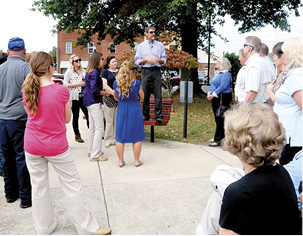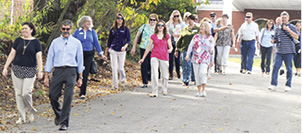‘Walkability audit’ gives insight into local accessability for pedestrians, bikers


Above, Clinton County Extension Agent Christy Nuetzman and Mark Fenton, an expert in “walkable communities”, led a group on a brief walkability audit Monday morning around Albany, during a session surrounding the accessibility of area streets and roads to pedestrians and bikers. The program was part of a grant that Clinton County has received and is being administered through the Clinton County EPHECT Health Coalition to study and find ways of improving the health status of local residents. Below, Fenton stood on a bench while talking to those on the walk near the Clinton County Courthouse. Clinton County is one of six Kentucky counties sharing funds in the $1.8 million grant program.
A national emphasis and push has been placed on awareness at every level that we, as a nation, are quickly becoming a more obese, out of shape and, mostly because of those two factors, a more unhealthy population than ever before.
With that in mind, groups and coalitions have been cropping up across the nation with the common goal of not only addressing those issues, but coming up with ways to combat the causes and hopefully give communities the chance to reverse the effects.
Albany and Clinton County is certainly no exception to the high obesity and resulting chronic disease issues, and we also have seen new coalitions and groups that have formed in the past few years to address just those very issues.
One of those groups, the Clinton County EPHECT Health Coalition, was recently chosen to be one of six Kentucky counties to share in a $1.8 million grant program designed to allow local leaders and citizens to come up with ways to tackle those very issues on the local level.
In addition to Clinton County, the other counties involved in the grant share include Logan, Letcher, Martin, Elliot and Lewis counties.
On Monday, about 30 members of the EPHECT Coalition met at the Albany First Baptist Church Community Room to share in a discussion of ways to make the community more exercise minded as well as ways to actually transform streets, roads and trails in the area to better fit the concept of attracting more walking and bicycle use.
Christy Nuetzman, Clinton County’s Food and Consumer Science Extension Agent with the University of Kentucky, has been serving as the EPHECT Coordinator and Chairperson, and through her efforts with the program, the group participated in a “Walkability Summit” on Monday.
With the goal of finding ways to promote a more active lifestyle among Albany and Clinton County residents, an expert in the design and integration of healthy, walkable communities spent this past weekend traveling area streets, roads and trails and looking at ways that existing routes could be transformed.
Mark Fenton, who for several years has been considered to be one of the nation’s top experts on making communities more “walkable”, gave a brief overview of his findings from the prior couple of days of observations.
Fenton, who has written several books on the subject and has worked with large and small communities across the nation to address the same issues as Albany and Clinton County is currently looking to improve, spent Monday morning with the EPHECT members.
Fenton has worked with several communities in Kentucky and in many cases, his suggestions have been put into place as an effort to improve not only the opportunity for pedestrians and bikers, but to also kick-start the idea that in order to combat the issue of poor health, we must first become a more active population.
He noted that by opening up opportunities for people to use motorized methods of transportation less and thus promoting walking and biking more, a community can actually benefit on multiple levels, including enjoying a cleaner environment.
In addition, the improvements he suggested, can also lead to a stronger local economy as well as boosting health qualities among its citizens.
Included in Fenton’s presentation Monday was the notion that in the past four decades, children have become more dependent on their parents for transportation, as opposed to what had been commonplace in years leading up to the early 1970s when it was more common for children to actually walk or ride bicycles as their primary form of getting from one place to another.
During that same time when the rate of finding “free range kids” in a sharp decline from 1969 to the present, the rates of childhood obesity has tripled.
Clinton County’s population currently has a rate of diabetes affliction of 11.8 percent, in comparison to the rate in Kentucky of eight percent and 8.4 percent across the nation.
Even more alarming is Clinton County’s rate of deaths in relation to heart disease, which in 2014 was listed as being 326.5 per 100,000 deaths. That compares with 224 deaths per 100,000 in Kentucky and 184.6 per 100,000 in the nation.
Fenton also pointed out that the three main factors that contribute to the growing unhealthy state of the current population is the use of tobacco, an inactive lifestyle and poor nutrition choices.
Fenton’s work in communities he visits is primarily geared toward ways to transform surroundings to promote more physical activity. It was those ideas that those attending Monday’s event heard him primarily address.
The group on hand Monday also heard Fenton talk about how existing Albany and Clinton County roads and streets could be transformed easily – often utilizing only striping paint and large planters – to be more inviting to pedestrian and bike traffic.
He noted that while there were many sidewalks already available in and around Albany, many of those now “led to nowhere” but could be connected with others in the area to create a more inviting and usable network that would promote a higher level of walking activity among residents.
Clinton County Judge/Executive Richard Armstrong, told Fenton that just in the past few days, he and Albany Mayor Nicky Smith had joined forces in an effort to obtain grant funding to extend the sidewalks on the north end of Albany, hopefully to the region around Clinton County High School and the Wellness Center and Mountain View Park.
Smith, who was also in attendance for the event Monday morning, has long been a proponent of finding funds to maintain existing sidewalks in the city limits, as well as extending and adding to the current sidewalk network.
Fenton also said another possible way to increase physical activity opportunities would be to establish a new Farmers Market in the downtown area, which would not only boost the chances for local citizens to incorporate more movement into their lives, but would also promote healthier nutrition as well as boosting the local agriculture economy.
The proposal for a new Farmers Market in the downtown Albany area is a project that is also currently being examined and is a likely development that will be a possibility in the coming months, according to Clinton County Agriculture Extension Agent Colby Guffey.
At the mid point of Monday’s event, several of those in attendance left the Albany First Baptist Church facility and completed a brief “walkability audit” led by Fenton and Nuetzman.
The group first made their way north down streets that were a block or two off of the main thoroughfare of U.S. 127, returning along Washington Street and around the courthouse square before returning to the church for the remainder of the session.
Several stops were made along the audit trip, with Fenton pointing out features the area already had that could easily be enhanced, while in other cases, complete transformations were discussed.
Monday’s event was just one of several that are being planned around the EPHECT grant to hopefully make Albany and Clinton County a healthier community for everyone, but especially for the children and youth who call it home.
Fenton pointed out that because of the current state of poor health choices, obesity and chronic disease associated with those traits, the current generation of children and youth are likely to be the first generation ever to have life expectancies that are actually shorter then their parents.
Anyone who would like to become involved with the Clinton County EPHECT Health Coalition is certainly welcome, and can learn more by contacting Nuetzman at the Clinton County Cooperative Extension Service Office at 387-5404.



